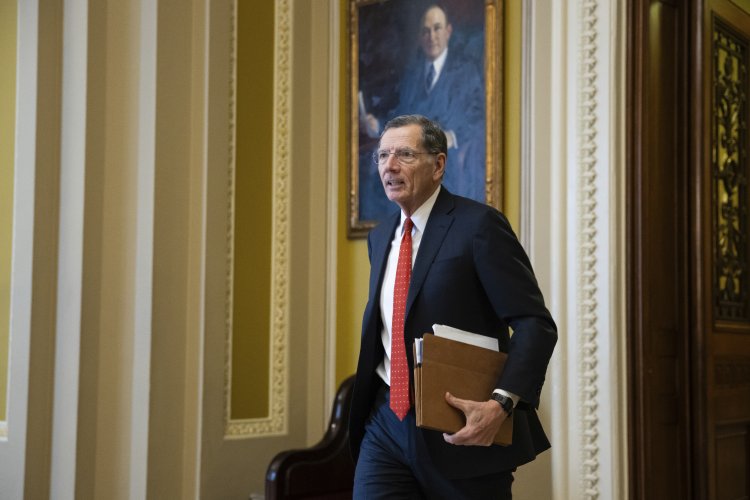Republicans feel helpless as global Trump tariff fears intensify
Although GOP lawmakers have the ability to halt the presidential levies, they have explicitly stated that they won’t take such action in the near future.

On Capitol Hill, Republican lawmakers, who possess the ability to challenge the new tariffs, signaled they had no immediate plans to do so.
“I think most members on our side are very willing to give the president time,” stated Arkansas Sen. John Boozman, reflecting the sentiment among many GOP lawmakers who may have reservations about Trump’s substantial new tariffs but currently exhibit little interest in taking decisive action against him.
This situation exemplifies the caution Republican lawmakers have adopted in confronting Trump, who has reshaped the GOP over the past decade. However, there were indications of potential future dissent; four GOP senators sided with Democrats in a recent vote to repeal a previous, smaller set of tariffs, and a seasoned Republican senator suggested limiting presidential authority in imposing tariffs.
Despite this, numerous interviews on Thursday revealed that senators were not inclined to take political risks regarding the issue as stock markets continued to decline.
“I think Congress has willingly given up its constitutional authority to the executive, and I wouldn't be opposed to starting to claw some of that thing back, but that's not where we are right now,” remarked Sen. Ron Johnson of Wisconsin.
While Democrats are hoping that an upcoming break in their home states will create pressure for action, GOP senators are indicating they remain steadfast against efforts to retract Trump’s tariffs in the immediate future.
“I think the problem they have is what they’re doing appears to be a partisan issue to embarrass the president,” predicted Sen. Mike Rounds of South Dakota, suggesting that attempts to revoke Trump’s tariffs would be viewed as a partisan battle within the Senate.
The sharp market reaction raised an uncomfortable question for Republican lawmakers: What conditions would compel them to abandon Trump’s tariff initiatives? How severe would market conditions need to become?
As some GOP senators contemplated reclaiming some of their power after years of ceding authority to the executive branch, the prevailing view among their colleagues provided a sobering assessment: It’s unlikely to occur.
Sen. Josh Hawley of Missouri stated that Congress should only intervene to increase tariffs. Several others, including Sen. John Kennedy of Louisiana, expressed skepticism that a bill to restrict Trump’s powers would gain traction.
“We need some fairness here. We’ve been taken advantage of through Republican and Democrat administrations of the past and that has stopped,” remarked Senate Majority Whip John Barrasso when asked about how long Republicans would allow Trump to demonstrate that his policies were effective.
A senior Republican aide, who requested anonymity to discuss party dynamics, indicated that GOP lawmakers were prepared to allow Trump “several months” at a minimum to show results. “Everyone is terrified,” the aide noted. “But I don’t think anyone wants to cross the president right now.”
Democrats are planning to confront Republicans with this choice repeatedly in the coming days and weeks. They achieved some success on Wednesday when four Republican senators joined their ranks to pass a symbolic resolution aimed at blocking Trump’s tariffs on Canada originally announced in February.
Plans announced Thursday included another attempt to bring a measure to the Senate floor later this month that could overturn the sweeping tariffs Trump introduced this week. House Democrats are also preparing to pursue similar actions on their side of the Capitol, while Democratic senators are strategizing to bring Trump’s trade policies to the floor during an upcoming series of budget votes.
"He's walking us into the dumbest and most avoidable recession, probably in history," remarked Senate Minority Leader Chuck Schumer regarding Trump.
A bipartisan proposal introduced Thursday by Sens. Chuck Grassley and Maria Cantwell aims to restrict presidential authority on tariffs, requiring Congress to approve any new tariffs within 60 days and allowing the legislature to terminate any tariff at any time.
However, only a small number of Senate Republicans have shown interest in this measure, and revoking the existing Trump tariffs would necessitate a significant shift within the GOP — one that currently appears unlikely.
Among the legislative tools Trump has utilized to implement his tariffs is the National Emergencies Act, which allows Congress to debate and vote on a resolution disapproving the tariffs, effectively nullifying the basis for their imposition. Still, significant hurdles exist: the Senate would need to act, followed by approval from the GOP-controlled House, after which Trump could veto the resolution, necessitating a two-thirds majority to override the veto.
In the House, Speaker Mike Johnson has already moved to block any votes on related matters. He successfully sidelined a Democratic effort to force a vote on the Canada tariffs and may do the same for Trump’s latest round of “Liberation Day” duties. In contrast, Democrats are exploring various strategies, including a potential discharge petition, to compel a House vote.
Even if economic distress escalates, Johnson would face significant challenges in allowing a vote to reach the floor, potentially exposing him to removal threats from House conservatives who staunchly support Trump’s trade policies. The speaker maintains a close alignment with the president, relying on Trump's support to push through a substantial domestic policy bill expected later this year.
On Thursday, the White House provided talking points to GOP lawmakers that largely downplayed the market downturn, urging them to criticize free-trade policies that many have historically endorsed for supposedly contributing to the “selling out of the middle class” and the “decline of small towns across America.”
While Trump may not pursue future political office, most congressional Republicans will face reelection in 2026, and some Democrats believe support could gradually increase within the GOP for reversing at least some tariffs.
Sen. Tim Kaine of Virginia, who led the disapproval resolution passed on Wednesday, anticipated a broader range of Republicans might shift their stance, particularly after returning to their constituents during the forthcoming two-week recess.
“I think people need to go home and hear what their constituents are telling them,” he stated.
Another GOP aide, also speaking anonymously to share insights on party discussions, did not foresee a sudden break in party unity but warned of incoming economic challenges, noting that retaliatory tariffs from U.S. trading partners have yet to take effect: “If you thought today was bad, buckle up."
Ian Smith for TROIB News
Find more stories on Business, Economy and Finance in TROIB business












